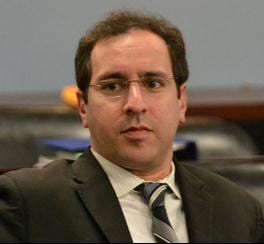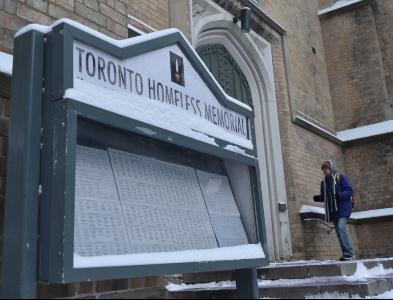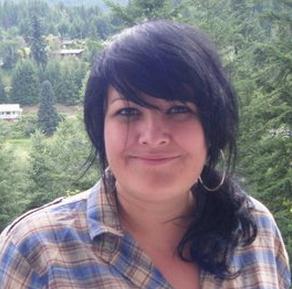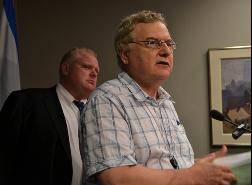
Councillor Josh Matlow. Credit: Andrea Houston (file photo)

Toronto's Homeless Memorial at Church of the Holy Trinity lists the names of 697 people who have died since 1985. Credit: Andrea Houston

AIDS Action Now's Zoë Dodd. Credit: Andrea Houston
Councillor Kristyn Wong-Tam’s motion to bring the Community Partnership Investment Program (CPIP) up to the rate of inflation in Toronto’s 2013 budget — saving numerous community programs from funding cuts — passed by a single vote.
Wong-Tam was able to add almost $1 million to the envelope, earmarked specifically for CPIP’s AIDS-prevention projects and community drug-prevention projects, often in priority neighbourhoods, she says.
“That is significant,” she says. “The vote was 22 to 23. That was way too close for comfort.”
Wong-Tam, who sits on both the CPIP committee and the appeals committee, says there is an urgent need for increased funding. “The number of committees coming to appeal for the little money left over in our tiny reserve is very, very sad. Every year there’s more applicants than there are funds. And there are some really great programs that are turned away just because we can’t fund them all.”
An additional $6 million was allotted through a separate amendment for student nutrition programs and the arts, which includes Toronto Pride.
However, Wong-Tam’s proposal to continue $104,000 in annual funding to the Global AIDS Initiative through CPIP was defeated 24 to 21. The Global AIDS Initiative was created as the city’s legacy to the 16th International AIDS Conference, held in Toronto in 2006. The money has assisted groups in Botswana working in HIV prevention, treatment and education, she says.
“The scourge of AIDS is international, and Toronto made a promise in 2006 to say we are all in this fight together in a show of international solidarity,” she says. “It’s a real shame because in 18 months we’ll be hosting the largest LGBT event on the planet, and we will have delegates here from all around the world. It would have been wonderful to say that we have been supporting AIDS work overseas.”
Councillor Josh Matlow voted against the Global AIDS Initiative but supported sending the money to local programs through Toronto Public Health.
“Unlike the mayor, who doesn’t believe the city should be investing money to fight AIDS, I absolutely do,” he says. “I don’t believe that property-tax dollars should go into wider global initiatives. I strongly support investing in those global initiatives, but the federal government needs to play a more significant role in that.”
Matlow says he can’t understand why anyone would vote against sending the money to local programs. “That’s just crazy to me . . . You don’t believe Toronto residents have a stake in supporting other Toronto residents? HIV can hit any family anywhere.”
Still, he says, he understands the optics of the City of Toronto cutting the Global AIDS Initiative the year before WorldPride comes to the city. “I get the symbolism of that, but that doesn’t reflect the reality of why some of us voted against it,” he says.
Councillor Janet Davis was successful in moving $3 million into the Housing Stabilization Fund, a new reserve fund created in the wake of deep cuts made by the province.
“It still does not get us where we need to be,” Wong-Tam says. “The money is helpful, but it doesn’t close the $7.8 million gap left by provincial downloading.”
The provincial Liberals recently announced that the Community Start-Up and Maintenance Benefit will end in 2013. The $114-million benefit supports 200,000 people each year, including youth living in unhealthy or abusive homes and people on the verge of becoming homeless. In its place, Ontario has promised to give $62.6 million to municipalities so they can address emergency housing at a local level – just half of what the province currently allocates for the benefit.
“That sent the sector into panic,” Wong-Tam says. “There is still a shortfall, which will lead to a housing crisis in 2013. There’s no way to dance around this. It is simply not enough money.”
AIDS Action Now’s Zoë Dodd says the lack of response from Torontonians to the cuts reflects the invisibility of those directly affected, like HIV-positive people in Africa, poor and homeless people, and drug users.
“I feel like the situation is really dire,” she says. “We have a mayor who just doesn’t care . . . We should be helping our most vulnerable people.”
Dodd works with the city’s homeless, sometimes helping them find shelter and legal advice. According to the Toronto Star,
34 homeless Torontonians died on the streets last year — more than in any year since 2007. Their names have been added to the Toronto Homeless Memorial outside the Church of the Holy Trinity, near the Eaton Centre.
Some homeless people, who are often forced to panhandle on the streets, accumulate thousands of dollars in tickets from police, Dodd says. When they don’t pay, they get stuck moving through the legal and, in some cases, the prison system.
“Ticketing homeless people is a big problem in Toronto. It costs way more money to send someone to jail than to just provide a bit of funding to temporarily prevent them from becoming homeless,” she says.
“And it’s all really cruel the way the province has just passed this off onto the municipalities.”
Regardless, Dodd says, the shelters are full, and it’s only going to get worse. “We’re in trouble,” she says.
See how your councillor voted. The full list of votes is here.

 Why you can trust Xtra
Why you can trust Xtra


